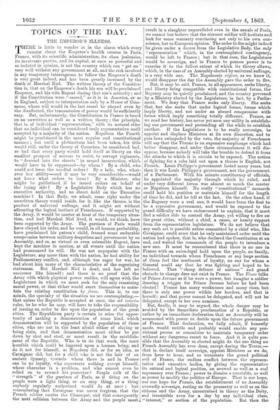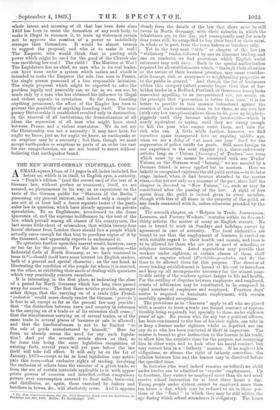TOPICS OF THE DAY.
THE EMPEROR'S ILLNESS.
THERE is little to wonder at in the alarm which every rumour about the Emperor's health creates in Paris. France, with its scientific administration, its class jealousies, its inveterate parties, and its capital, at once so powerful and so isolated in opinion, is not the country which can "get on" very well without any government at all, and the risk involved in any temporary interregnum to follow the Emperor's death is very great indeed, and has been greatly increased by the death of Marshal Niel. The written theory of the Constitu- tion is, that on the Emperor's death his son will be proclaimed Emperor, and his wife Regent during that son's minority; and if the Constitution were "sacred," as it is in America, or as in England, subject to interpretation only by a House of Com- mons, whose will would in the last resort be obeyed even by the disaffected, the transmission of power would be sufficiently easy. But, unfortunately, the Constitution in France is based on an unwritten as well as a written theory ; the principle, that is, of individual "representation," with its natural rider that no individual can be considered truly representative until accepted by a majority of the nation. Napoleon the Fourth might be proclaimed in the most regular and constitutional manner ; but until a plebiscitum had been taken, his title would still, under the theory of Csarism, be considered bad, so bad that every party would hold itself at liberty on the smallest prospect of success to resist, to corrupt regiments, to "descend into the streets "in armed insurrection, which would have to be suppressed—by whom ? By a child, who could not issue the needful orders ? By a lady, who, what- ever her ability—and it may be very considerable—would not know what orders to issue ? By a Minister, who might be guillotined if he issued orders on behalf of the losing side ? By a Legislative Body which has no executive authority, and no direct hold on the Executive machine ? In that Body, we admit, some right under the unwritten theory would reside, for it, like the throne, is the product of universal suffrage, and it might act without affronting the logical instinct of Frenchmen. If supported by the Army, it would be master at least of the temporary situa- tion, and had Marshal Niel lived, it would, we think, have been supported by the Army. The garrison of Paris would have obeyed his order, and he would, in all human probability, have proclaimed his patron's child, framed some endurable compromise between military despotism and government by an Assembly, and so, as virtual or even ostensible Regent, have kept the machine in motion, at all events until the nation had pronounced its will. He was not unpopular with the Legislature, any more than with the nation, he had ability for Parliamentary conflict, and, although too eager for war, he had about him many of the characteristics of the organizing statesman. But Marshal Niel is dead, and has left no successor like himself ; and there is no proof that the Army with which physical power resides, will agree with the Legislature in which we must seek for the only remaining moral power, or that either would exert themselves to main- tain the existing constitution by force. This is, to our minds, the specialty of the situation we are contemplating,— that unless the Republic is accepted at once, the ad interim ruler, be he who he may, will have to take the responsibility of issuing an order to fire upon the population of the great cities. The Republican party is certain to seize the oppor- tunity of making a demonstration of some kind, which demonstration will be supported by the population of those cities, who are not in the least afraid either of slaying or being slain, and that demonstration must either be put down by shot and steel, or must result in the establish- ment of the Republic. Who is to do that work, the most horrible which could be imposed upon a human being, and do it not for himself, as Napoleon did, or for an idea, as Cavaignac did, but for a child who is not the heir of an ancient dynasty, towards whom there is and in France can be no loyalty, who represents nothing except himself, whose character is a problem, and who cannot even be relied on to reward his protector? People talk of the " strength " of the garrison of Paris, as if firing on the people were a light thing, or an easy thing, or a thing anybody regularly authorized would do at once ; but remembering that Cavaignac was never forgiven, that the French soldier carries the Chassepot, and that consequently the next collision between the Army and the people must
result in a slaughter unparalleled even in the annals of Paris, we cannot but believe that the sternest soldier will hesitate and look for some warranty convincing not only to his own con- science, but to European opinion. The order to fire might indeed be given under a decree from the Legislative Body, the only " representation " which, in the contemplated contingency, would be left to France ; but in that case, the Legislature would be sovereign, and in France to possess power is to exercise it to the fullest extent of which its theory allows, which, in the case of an Assembly elected by universal suffrage,
is a very wide one. The Napoleonic regime, as we know it, would disappear the day the Assembly gave the order to fire. But, it may be said, France, to all appearance, seeks liberty, and liberty being compatible with constitutional forms, the Regency may be quietly proclaimed, and the country governed by a Ministry elected by the Legislature, in fact, by a Parlia- ment. We deny that France seeks only liberty. She seeks that, but she seeks that under logical forms, forms which imply liberty, and not under an absurd compromise with forms which imply something totally different. France, as we read her history, has never yet seen any utility in establish- ing one government and pretending all the while to establish another. If the Legislature is to be really sovereign, to appoint and displace Ministers at its own discretion, and to pass laws unimpeded by the veto, the majority of Frenchmen will say that the Throne is an expensive surplusage which had better disappear, and under those circumstances it will dis- appear, because nobody will take the trouble to defend it from the attacks to which it is certain to be exposed. The notion of fighting for a robe laid out upon a throne is English, not French. Louis Philippe's government lasted many years, but then it was Louis Philippe's government, not the government. of a Parliament. With his minute constituency of officials, he appointed the majority through which he ruled, and under very different forms was almost as much the master as Napoleon himself. No really "constitutional" monarch could hold his position or maintain himself for the length of time he did, and he fell at the last. On the other hand, if the Regency were a real one, it would have from the first to be a repressive government, and would be exposed to the grand difficulty we have endeavoured to explain, that it must find a soldier able to control the Army, yet willing to fire on the great cities, without a chief, a cause, or hearty support from the representative legislature. We do not believe that any such act is possible unless committed by a chief who, like Cavaignac, could avow that he only maintained order until the nation had spoken, that is, who declared the Constitution at an end, and waited the commands of the people to introduce a new one. It must be remembered that there is no one in France with an extra-legal hold upon the people, no family, no individual towards whom Frenchmen or any large section of them feel the sentiment of loyalty, no one for whom a. General could say that he was fighting and hoped to be believed. That "cheap defence of nations" and grand obstacle to change does not exist in France. The Times talks of Prince Jerome as if he were a power, but imagine a soldier drawing a trigger for Prince Jerome before he had been elected ! France has many weaknesses and many vices, but there is only one power within her borders, and that is. herself; and that power cannot be delegated, and will not be delegated, except to her own nominee.
But, finally, it may be argued, the whole danger may be avoided by the iinmediate proclamation of a Republic, or rather by an immediate declaration that an Assembly will be summoned with power to decide upon the future government of France. That declaration, we fully admit, if honestly made, would entitle and probably would enable any pro- visional person or committee to maintain temporary order without any dangerous resort to force. And it is quite pos- sible that the Assembly so elected might do the one thing no French Assembly has ever done, except during the Terror,— that is, declare itself sovereign, appoint Ministers as we do, from hour to hour, and so terminate the grand political evil of France, the endless conflict between the represen- tative and executive bodies, by giving the representative its natural and logical position, an avowed as well as a real supremacy over France ; power to dismiss a constable, as well as power to modify the politics of Europe. That is our hope, our one hope for France, the establishment of an Assembly avowedly sovereign, resting on the peasantry as well as on the citizens and the Army, unrestrained in theory as the Deity, and irresistible even for a day by any individual class, "interest," or section of the population. But then the
whole intent and meaning of all that has been done since 1852 has been to resist the formation of any such body, to make it illegal to summon it, to train up statesmen certain .not to approve the creation of a power so indefinitely +stronger than themselves. It would be almost treason to suggest the proposal, and who is to make it real ? The Empress, who would think that in parting with power which might be used for the good of the Church she was sacrificing her soul ? The child ? The Minister at War ? 'The Legislature has no chief, no man who is its real leader, can have none under a system which makes and which is intended to make the Emperor the sole free man in France, the single person possessed of a free responsible initiative. The single proposal which might be expected to solve the problem legally and peaceably can, so far as we can see, be made only by a man who has obtained his influence by illegal and violent appeals to revolution. So far from founding anything permanent, the effect of the Empire has been to prevent the possibility of anything founding itself. The tem- porary Dictatorship it established resulted only in destruction, in the removal of all institutions, the demoralization of all ideas, the repression of all men who might have stood between France and a violent convulsion. We do not say +the Dictatorship was not a necessity ; it may have been, for .aught we know, just as, for aught we know, an earthquake or an eruption may be a necessity ; but then, though we must .accept earthquakes or eruptions as parts of an order too vast for our comprehension, we are not bound to assert without !believing that earthquakes found.































 Previous page
Previous page